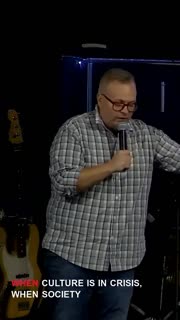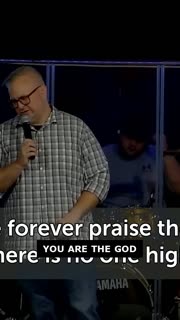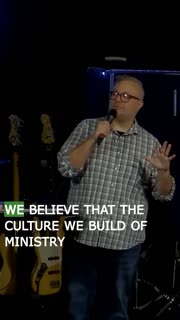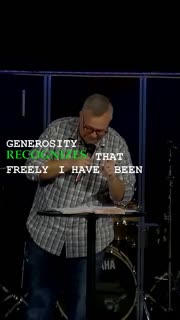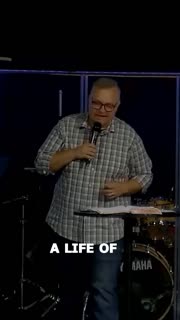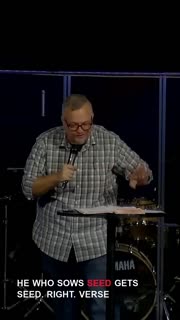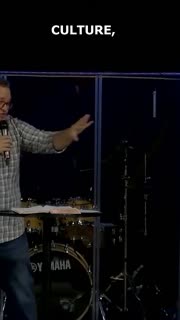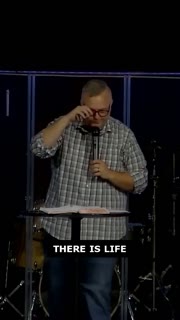Embracing Generosity and Prayer in Challenging Times
Devotional
Sermon Summary
Bible Study Guide
Sermon Clips
1. "He is better than you can comprehend, better than we deserve. He loves you this morning with an everlasting love. He is a good God who has good for you." [29:18] (12 seconds)
2. "Our responsibility when culture is in crisis, when society is at the brink, isn't to get on social media unless we're lifting up and encouraging, isn't to post a political..." [33:58] (14 seconds)
3. "We are not citizens of this world. We are citizens of a kingdom and we have a better story to tell. And Lord, what this world needs is not another political rhetoric or article or post. What this world needs is a true heart change from the presence of God." [35:54] (13 seconds)
4. "You are the God of wisdom. You are the God of peace. You are the God of healing. You are the God that puts broken things back together. And Lord, if we're honest, our country, our nation, our people, our culture, our society, we are broken. Lord, we make our appeal to you today that you would begin to put us back together by your spirit." [39:40] (16 seconds)
5. "We believe that the culture we build of ministry impacts generationally, right? But we also believe, and we aren't structured as a pastor-led driven thing only. We are only as successful in reaching people as we operate collectively, right?" [52:40] (16 seconds)
6. "Generosity recognizes that freely I have been given, so freely I can give. Again, I want you to understand this isn't about tithing on its face, although that's a component of generosity. This is about our willingness to invest and to sow into the kingdom. Into the kingdom of God and into the people of God. And that's a heart condition." [01:13:48] (21 seconds)
7. "A life of generosity is not a matter of means, but of trust. Good, because I don't have it, God." [01:14:51] (7 seconds)
8. "He who sows seed gets seed. Right. Verse 10 says he who supplies seed to the sower and bread for food will supply and multiply your seed for sowing. And increase the harvest of your righteousness. So I want you to understand this principle. He who sows seed. Guess what they get more of. They get more seed. Why? Because they have shown themselves trustworthy with seed. They now have more to sow." [01:21:41] (18 seconds)
9. "Culture, society will tell you. Us four no more. Keep what you got. The question and the answer is my trust. Am I trusting God? Is my trust in him complete? My answer is yes. There is so much freedom on the other side of my yes." [01:30:43] (51 seconds)
10. "There is life on the other side of yes. There is a change of our perspective and openness to a world of possibilities and opportunities of yes. And what it does is it positions us to be used by God." [01:32:06] (16 seconds)
Ask a question about this sermon
2. "Our responsibility when culture is in crisis, when society is at the brink, isn't to get on social media unless we're lifting up and encouraging, isn't to post a political..." [33:58] (14 seconds)
3. "We are not citizens of this world. We are citizens of a kingdom and we have a better story to tell. And Lord, what this world needs is not another political rhetoric or article or post. What this world needs is a true heart change from the presence of God." [35:54] (13 seconds)
4. "You are the God of wisdom. You are the God of peace. You are the God of healing. You are the God that puts broken things back together. And Lord, if we're honest, our country, our nation, our people, our culture, our society, we are broken. Lord, we make our appeal to you today that you would begin to put us back together by your spirit." [39:40] (16 seconds)
5. "We believe that the culture we build of ministry impacts generationally, right? But we also believe, and we aren't structured as a pastor-led driven thing only. We are only as successful in reaching people as we operate collectively, right?" [52:40] (16 seconds)
6. "Generosity recognizes that freely I have been given, so freely I can give. Again, I want you to understand this isn't about tithing on its face, although that's a component of generosity. This is about our willingness to invest and to sow into the kingdom. Into the kingdom of God and into the people of God. And that's a heart condition." [01:13:48] (21 seconds)
7. "A life of generosity is not a matter of means, but of trust. Good, because I don't have it, God." [01:14:51] (7 seconds)
8. "He who sows seed gets seed. Right. Verse 10 says he who supplies seed to the sower and bread for food will supply and multiply your seed for sowing. And increase the harvest of your righteousness. So I want you to understand this principle. He who sows seed. Guess what they get more of. They get more seed. Why? Because they have shown themselves trustworthy with seed. They now have more to sow." [01:21:41] (18 seconds)
9. "Culture, society will tell you. Us four no more. Keep what you got. The question and the answer is my trust. Am I trusting God? Is my trust in him complete? My answer is yes. There is so much freedom on the other side of my yes." [01:30:43] (51 seconds)
10. "There is life on the other side of yes. There is a change of our perspective and openness to a world of possibilities and opportunities of yes. And what it does is it positions us to be used by God." [01:32:06] (16 seconds)

